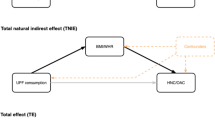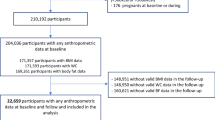Abstract
Objectives: The purpose of this paper was to investigate the relationship between food and beverage consumption and the development of breast cancer in men.
Methods: Possible relationships of dietary factors to risk of breast cancer in men were assessed in a case-control study conducted between 1983 and 1986. Cases (N=220) were ascertained from ten population-based cancer registries. Controls (N=291) were selected by random-digit dialing (<age 65) and from Health Care Financing Administration Medicare beneficiary lists (≥age 65).
Results: No trends in risk were observed with increasing intakes of specific foods, except for an increase in risk with citrus fruits. No increase in risk with increasing amounts of specific fats, vitamins, or minerals or with amounts of protein, fiber, carbohydrate, starches, nitrites, or alcohol consumed was observed, except for an increase in risk with dietary vitamin C consumption. A decreasing trend in risk with dietary niacin and with coffee and an increasing trend in risk with tea consumption were observed. No associations were found with use of any dietary supplements, including vitamin C.
Conclusions: The observed associations are not consistent with findings from studies of breast cancer in women and probably do not represent causal relationships. Dietary factors are unlikely to be strong determinants of breast cancer in men.
Similar content being viewed by others
References
Thomas DB (1993) Breast cancer in men. Epidemiol Rev 15: 220-231.
Schatzkin A, Greenwald P, Byar DP, Clifford CK (1989) The dietary fat-breast cancer hypothesis is alive. JAMA 261: 3284-3287.
Howe GR, Hirohata T, Hislop, et al. (1990) Dietary factors and risk of breast cancer: Combined analysis of 12 case-control studies. J Natl Cancer Inst 82: 561-569.
Graham S, Spiegelman, Adami HO, et al. (1996) Cohort studies of fat intake and the risk of breast cancer — a pooled analysis. N Engl J Med 334: 356-361.
Hunter DJ, Mason JE, Colditz GA, et al. (1995) A prospective study of the intake of vitamins C, E, and A and the risk of breast cancer. N Engl J Med 329: 234-240.
Hunter DJ, Willett WC (1993) Diet, body size, and breast cancer. Epidemiol Rev 15: 110-132.
Prentice RL, Sheppard L (1990) Dietary fat and cancer: consistency of epidemiologic data and disease prevention that may follow from a practical reduction in fat consumption. Cancer Causes Control 1: 81-97.
Olsson H, Ranstam J (1988) Head trauma and exposure to prolactin-elevating drugs as risk factors for male breast cancer. J Natl Cancer Inst 80: 79-83.
Casagrande JT, Hanish R, Pike MC, et al. (1988) A case-control study of male breast cancer. Cancer Res 48: 1326-1330.
Lenfant-Pejovic MH, Mlika-Cabanne N, Bouchardy C, et al. (1990) Risk factors for male breast cancer: a Franco-Swiss case-control study. Int J Cancer 45: 661-665.
Rosenblatt KA, Thomas DB, McTiernan A, et al. (1991) Breast cancer in men: aspects of familial aggregation. J Natl Cancer Inst 83: 849-851.
Thomas DB, Jimenez CM, McTiernan A, et al. (1992) Breast cancer in men & risk factors with hormonal implications. Am J Epidemiol 135: 734-738.
Mabuchi K, Bross DS, Kessler II (1985) Risk factors for male breast cancer. J Natl Cancer Inst 74: 371-375.
Schottenfeld D, Lilienfeld AM, Diamond H (1963) Some observations on the epidemiology of breast cancer among males. Am J Public Health 53: 890-897.
Thomas DB, Rosenblatt KA, Jimenez LM, et al. (1994) Ionizing radiation and male breast cancer. Cancer Causes Control 5: 9-14.
Demers PA, Thomas DB, Rosenblatt KA, et al. (1991) Occupational exposure to electromagnetic fields and breast cancer in men. Am J Epidemiol 134: 340-347.
Xu Z (1991) A case-control study on male breast cancer. Chinese Public Health 10: 1-4.
McTiernan A, Thomas DB, Whitehead A, et al. (1986) Efficient selection of controls for multi-centered study of rare diseases. Am J Epidemiol 1238: 901-904.
Stalsberg H, Thomas DB, Rosenblatt KA, et al. (1993) Histologic types and hormone receptors in breast cancer in men: a population-based study in 282 United States men. Cancer Causes Control 4: 143-151.
Willett, W (1990) Nutritional Epidemiology. New York: Oxford University Press.
Breslow NE, Day NE (1980) Statistical Methods in Cancer Research, Vol 1, The Analysis of Case-Control Studies. Lyon: IARC Sci Publ 32: 5-338.
Willett W, Stampfer MJ (1986) Total energy intake: implications for epidemiologic analyses. Am J Epidemiol 124: 17-27.
Sempos CT (1992) Invited commentary: some limitations of semiquantitative food frequency questionnaires. Am J Epidemiol 135: 1127-1132.
Michels KB, Willett WC (1994) Vitamins and cancer: a practical means of prevention? Important Adv Oncol, pp. 85-114.
Zaridze D, Litanova Y, Maximovich D, Day NE, Duffy SW (1991) Diet, alcohol consumption and reproductive factors in a case-control study of breast cancer in Moscow. Int J Cancer 48: 443-501.
Rohan TE, Howe GR, Friedenreich CM, Jain M, Miller AB (1993) Dietary fiber, vitamins A, C, and E and risk of breast cancer: a cohort study. Cancer Causes Control 4: 29-37.
Jacobson EL (1993) Niacin deficiency and cancer in women. J Am Col Nutr: 412-416.
Jacobson EL, Jacobson MC (1993) A biomarker for the assessment of niacin nutritive as a potential preventative factor in carcinogenesis. J Int Med 233: 59-62.
Vobecky J, Simard A, Vobecky JS, et al. (1993) Nutritional profile of women with fibrocystic breast disease. Int J Epidemiol 22: 989-999.
Dupont WD, Page DL (1985) Risk factors for breast cancer in women with proliferative breast disease. N Engl J Med 312: 246-251.
Page DL, Dupont WD, Rogers LW (1985) Atypical hyperplastic lesions of the female breast. A long-term follow-up study. Cancer 55: 2698-2708.
Webber W, Boyd NA (1986) A critique of the methodology of studies on benign breast disease and breast cancer risk. J Natl Cancer Inst 77: 397-404.
Rosenberg L, Metzger LS, Palmer JR (1993) Alcohol consumption and risk of breast cancer. A review of the epidemiologic evidence. Epidemiol Rev 15: 133-144.
Schatzkin A, Longnecker MP (1994) Alcohol and breast cancer. Where are we now and where do we go from here? Cancer 74: 1101-1110.
Reichman ME, Judd JT, Longcope C, Schatzkin A, Clevidence BA, et al. (1993) Effects of alcohol consumption on plasma and urinary hormone concentrations in premenopausal women. J Natl Cancer Inst 85: 722-727.
Welsch CW (1994) Caffeine and the development of the normal and neoplastic mammary gland. Proc Soc Exper Biol Med 207: 1-12.
Lubin F, Ron E, Wax Y, Modan B (1985) Coffee and methylxanthines and breast cancer: a case-control study. J Natl Cancer Inst 74: 569-573.
Le MG (1985) Coffee consumption, benign breast disease, and breast cancer (letter). Am J Epidemiol 122: 391-399.
Yang CS, Wang Z (1993) Tea and cancer. J Natl Cancer Inst 85: 1038-1049.
Goldbohm RA, Hertog MG, Brants HA, van Poppel, van den Brandt PA (1996) Consumption of black tea and cancer risk: a prospective study. J Natl Cancer Inst 88: 93-100.
Author information
Authors and Affiliations
Corresponding author
Rights and permissions
About this article
Cite this article
Rosenblatt, K.A., Thomas, D.B., Jimenez, L.M. et al. The relationship between diet and breast cancer in men (United States). Cancer Causes Control 10, 107–113 (1999). https://doi.org/10.1023/A:1008808925665
Issue Date:
DOI: https://doi.org/10.1023/A:1008808925665




